| Listing 1 - 10 of 10 |
Sort by
|
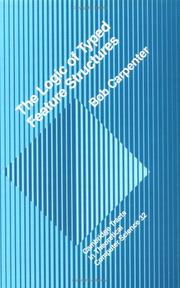
ISBN: 0521419328 Year: 1992 Publisher: Cambridge Cambridge University press
Abstract | Keywords | Export | Availability | Bookmark
 Loading...
Loading...Choose an application
- Reference Manager
- EndNote
- RefWorks (Direct export to RefWorks)
This book develops the theory of typed feature structures, a new form of data structure that generalizes both the first-order terms of logic programs and feature-structures of unification-based grammars to include inheritance, typing, inequality, cycles and intensionality. It presents a synthesis of many existing ideas into a uniform framework, which serves as a logical foundation for grammars, logic programming and constraint-based reasoning systems. Throughout the text, a logical perspective is adopted that employs an attribute-value description language along with complete equational axiomatizations of the various systems of feature structures. Efficiency concerns are discussed and complexity and representability results are provided. The application of feature structures to phrase structure grammars is described and completeness results are shown for standard evaluation strategies. Definite clause logic programs are treated as a special case of phrase structure grammars. Constraint systems are introduced and an enumeration technique is given for solving arbitrary attribute-value logic constraints. This book with its innovative approach to data structures will be essential reading for researchers in computational linguistics, logic programming and knowledge representation. Its self-contained presentation makes it flexible enough to serve as both a research tool and a textbook.
Data structures (Computer science) --- Logic programming --- 681.3*F41 --- 681.3*I23 --- 681.3*I23 Deduction and theorem proving: answer/reason extraction reasoning resolution metatheory mathematical induction logic programming (Artificial intelligence) --- Deduction and theorem proving: answer/reason extraction reasoning resolution metatheory mathematical induction logic programming (Artificial intelligence) --- Information structures (Computer science) --- Structures, Data (Computer science) --- Structures, Information (Computer science) --- 681.3*F41 Mathematical logic: computability theory computational logic lambda calculus logic programming mechanical theorem proving model theory proof theoryrecursive function theory--See also {681.3*F11} {681.3*I22} {681.3*I23} --- Mathematical logic: computability theory computational logic lambda calculus logic programming mechanical theorem proving model theory proof theoryrecursive function theory--See also {681.3*F11} {681.3*I22} {681.3*I23} --- 681.3*I23 Deduction and theorem proving: answer/reason extraction; reasoning; resolution; metatheory; mathematical induction; logic programming (Artificial intelligence) --- Deduction and theorem proving: answer/reason extraction; reasoning; resolution; metatheory; mathematical induction; logic programming (Artificial intelligence) --- 681.3*F41 Mathematical logic: computability theory; computational logic; lambda calculus; logic programming; mechanical theorem proving; model theory; proof theory;recursive function theory--See also {681.3*F11}; {681.3*I22}; {681.3*I23} --- Mathematical logic: computability theory; computational logic; lambda calculus; logic programming; mechanical theorem proving; model theory; proof theory;recursive function theory--See also {681.3*F11}; {681.3*I22}; {681.3*I23} --- Computer programming --- Electronic data processing --- File organization (Computer science) --- Abstract data types (Computer science) --- Data structures (Computer science). --- Logic programming.
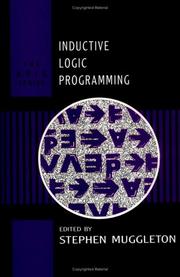
ISBN: 0125097158 9780125097154 Year: 1992 Volume: 38 Publisher: London Academic press
Abstract | Keywords | Export | Availability | Bookmark
 Loading...
Loading...Choose an application
- Reference Manager
- EndNote
- RefWorks (Direct export to RefWorks)
Computer science --- Mathematical logic --- Logic Programming --- Machine Learning --- 681.3*F41 --- 681.3*I23 --- 681.3*I26 --- Mathematical logic: computability theory; computational logic; lambda calculus; logic programming; mechanical theorem proving; model theory; proof theory;recursive function theory--See also {681.3*F11}; {681.3*I22}; {681.3*I23} --- Deduction and theorem proving: answer/reason extraction; reasoning; resolution; metatheory; mathematical induction; logic programming (Artificial intelligence) --- Learning: analogies; concept learning; induction; knowledge acquisition; language acquisition; parameter learning (Artificial intelligence)--See also {681.3*K32} --- 681.3*I26 Learning: analogies; concept learning; induction; knowledge acquisition; language acquisition; parameter learning (Artificial intelligence)--See also {681.3*K32} --- 681.3*I23 Deduction and theorem proving: answer/reason extraction; reasoning; resolution; metatheory; mathematical induction; logic programming (Artificial intelligence) --- 681.3*F41 Mathematical logic: computability theory; computational logic; lambda calculus; logic programming; mechanical theorem proving; model theory; proof theory;recursive function theory--See also {681.3*F11}; {681.3*I22}; {681.3*I23}
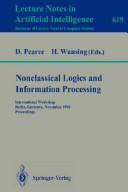
Abstract | Keywords | Export | Availability | Bookmark
 Loading...
Loading...Choose an application
- Reference Manager
- EndNote
- RefWorks (Direct export to RefWorks)
Artificial intelligence --- Electronic data processing --- Logic, Symbolic and mathematical --- 681.3*F41 --- 681.3*I23 --- 681.3*I23 Deduction and theorem proving: answer/reason extraction; reasoning; resolution; metatheory; mathematical induction; logic programming (Artificial intelligence) --- Deduction and theorem proving: answer/reason extraction; reasoning; resolution; metatheory; mathematical induction; logic programming (Artificial intelligence) --- 681.3*F41 Mathematical logic: computability theory; computational logic; lambda calculus; logic programming; mechanical theorem proving; model theory; proof theory;recursive function theory--See also {681.3*F11}; {681.3*I22}; {681.3*I23} --- Mathematical logic: computability theory; computational logic; lambda calculus; logic programming; mechanical theorem proving; model theory; proof theory;recursive function theory--See also {681.3*F11}; {681.3*I22}; {681.3*I23} --- Congresses --- Mathematical logic --- Artificial intelligence. Robotics. Simulation. Graphics
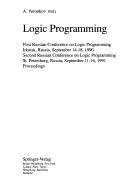
ISBN: 3540554602 0387554602 3540470832 Year: 1992 Volume: vol 592 vol *63 Publisher: New York, NY : Springer-Verlag,
Abstract | Keywords | Export | Availability | Bookmark
 Loading...
Loading...Choose an application
- Reference Manager
- EndNote
- RefWorks (Direct export to RefWorks)
This volume contains the proceedings of two Russian conferences on logic programming, held in 1990 in Irkutsk and in 1991 in St. Petersburg. The aim of the conferences was to bring together researchers from the Russian and the international logic programming communities. Topics covered in the volume include: logic programming, automated theorem proving, non-monotonic reasoning, applications of mathematical logic to computer science, deductivedatabases, implementation of declarative concepts, and programming in non-classical logics. This is the first volume to represent activity in the field of logic programming in the countries of the former Soviet Union.
Artificial intelligence. Robotics. Simulation. Graphics --- Logic programming --- -681.3*F41 --- 681.3*I23 --- Computer programming --- Congresses --- Mathematical logic: computability theory; computational logic; lambda calculus; logic programming; mechanical theorem proving; model theory; proof theory;recursive function theory--See also {681.3*F11}; {681.3*I22}; {681.3*I23} --- Deduction and theorem proving: answer/reason extraction; reasoning; resolution; metatheory; mathematical induction; logic programming (Artificial intelligence) --- 681.3*I23 Deduction and theorem proving: answer/reason extraction; reasoning; resolution; metatheory; mathematical induction; logic programming (Artificial intelligence) --- 681.3*F41 Mathematical logic: computability theory; computational logic; lambda calculus; logic programming; mechanical theorem proving; model theory; proof theory;recursive function theory--See also {681.3*F11}; {681.3*I22}; {681.3*I23} --- 681.3*F41 --- Logic programming - Congresses. --- Logic, Symbolic and mathematical. --- Logic design. --- Computer science. --- Artificial intelligence. --- Mathematical Logic and Foundations. --- Logics and Meanings of Programs. --- Programming Techniques. --- Mathematical Logic and Formal Languages. --- Artificial Intelligence. --- AI (Artificial intelligence) --- Artificial thinking --- Electronic brains --- Intellectronics --- Intelligence, Artificial --- Intelligent machines --- Machine intelligence --- Thinking, Artificial --- Bionics --- Cognitive science --- Digital computer simulation --- Electronic data processing --- Logic machines --- Machine theory --- Self-organizing systems --- Simulation methods --- Fifth generation computers --- Neural computers --- Informatics --- Science --- Design, Logic --- Design of logic systems --- Digital electronics --- Electronic circuit design --- Logic circuits --- Switching theory --- Algebra of logic --- Logic, Universal --- Mathematical logic --- Symbolic and mathematical logic --- Symbolic logic --- Mathematics --- Algebra, Abstract --- Metamathematics --- Set theory --- Syllogism
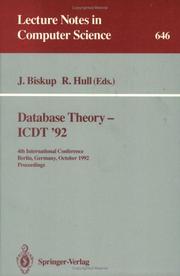
ISBN: 0387560394 3540560394 Year: 1992 Volume: 646 Publisher: Berlin : Springer-Verlag,
Abstract | Keywords | Export | Availability | Bookmark
 Loading...
Loading...Choose an application
- Reference Manager
- EndNote
- RefWorks (Direct export to RefWorks)
681.3*H2 --- Database management --- 681.3*F13 --- 681.3*F41 --- 681.3*I2 --- Database management: security; integrity; protection--See also {?681.5*E5} --- Congresses. --- Complexity classes: complexity hierarchies; machine-independent complexity; reducibility and completeness; relations among complexity classes; relations among complexity measures (Computation by abstract devices)--See also {681.3*F2} --- Mathematical logic: computability theory; computational logic; lambda calculus; logic programming; mechanical theorem proving; model theory; proof theory;recursive function theory--See also {681.3*F11}; {681.3*I22}; {681.3*I23} --- Artificial intelligence. AI --- 681.3*I2 Artificial intelligence. AI --- 681.3*F41 Mathematical logic: computability theory; computational logic; lambda calculus; logic programming; mechanical theorem proving; model theory; proof theory;recursive function theory--See also {681.3*F11}; {681.3*I22}; {681.3*I23} --- 681.3*F13 Complexity classes: complexity hierarchies; machine-independent complexity; reducibility and completeness; relations among complexity classes; relations among complexity measures (Computation by abstract devices)--See also {681.3*F2} --- 681.3*H2 Database management: security; integrity; protection--See also {?681.5*E5} --- Bases de données --- Congresses --- Gestion --- Congrès --- Databases.
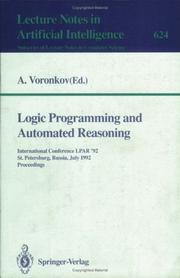
ISBN: 038755727X 354055727X 3540472797 Year: 1992 Publisher: Berlin : Springer-Verlag,
Abstract | Keywords | Export | Availability | Bookmark
 Loading...
Loading...Choose an application
- Reference Manager
- EndNote
- RefWorks (Direct export to RefWorks)
This volume contains the proceedings of LPAR '92, the international conference on logic programming and automated reasoning held in St. Petersburg in July 1992. The aim of the conference was to bring together researchers from the Russian and the international logic programming and theorem proving communities. The topics of interest covered by papers inthe volume include automated theorem proving, non-monotonic reasoning, applications of mathematical logic to computer science, deductive databases, implementation of declarative concepts, and programming in non-classical logics. LPAR '92 is the successor of the First and Second Russian Conferences on Logic Programming held in 1990 and 1991, respectively, the proceedings of which were publishedin LNAI Vol. 592.
Automatic theorem proving --- -Logic programming --- -681.3*F41 --- 681.3*I23 --- Computer programming --- Automated theorem proving --- Theorem proving, Automated --- Theorem proving, Automatic --- Artificial intelligence --- Proof theory --- Congresses --- Mathematical logic: computability theory; computational logic; lambda calculus; logic programming; mechanical theorem proving; model theory; proof theory;recursive function theory--See also {681.3*F11}; {681.3*I22}; {681.3*I23} --- Deduction and theorem proving: answer/reason extraction; reasoning; resolution; metatheory; mathematical induction; logic programming (Artificial intelligence) --- Logic programming --- 681.3*I23 Deduction and theorem proving: answer/reason extraction; reasoning; resolution; metatheory; mathematical induction; logic programming (Artificial intelligence) --- 681.3*F41 Mathematical logic: computability theory; computational logic; lambda calculus; logic programming; mechanical theorem proving; model theory; proof theory;recursive function theory--See also {681.3*F11}; {681.3*I22}; {681.3*I23} --- 681.3*F41 --- Artificial intelligence. --- Computer science. --- Logic, Symbolic and mathematical. --- Artificial Intelligence. --- Mathematical Logic and Formal Languages. --- Mathematical Logic and Foundations. --- Algebra of logic --- Logic, Universal --- Mathematical logic --- Symbolic and mathematical logic --- Symbolic logic --- Mathematics --- Algebra, Abstract --- Metamathematics --- Set theory --- Syllogism --- Informatics --- Science --- AI (Artificial intelligence) --- Artificial thinking --- Electronic brains --- Intellectronics --- Intelligence, Artificial --- Intelligent machines --- Machine intelligence --- Thinking, Artificial --- Bionics --- Cognitive science --- Digital computer simulation --- Electronic data processing --- Logic machines --- Machine theory --- Self-organizing systems --- Simulation methods --- Fifth generation computers --- Neural computers
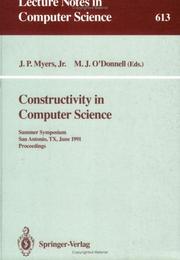
ISBN: 3540556311 0387556311 3540472657 Year: 1992 Volume: vol 613 Publisher: Berlin : Springer-Verlag,
Abstract | Keywords | Export | Availability | Bookmark
 Loading...
Loading...Choose an application
- Reference Manager
- EndNote
- RefWorks (Direct export to RefWorks)
Mathematicians have long recognized the distinction between an argument showing that an interesting object exists and a procedure for actually constructing the object. Computer science adds a new dimension of interest in constructivity, since a computer program is a formal description of a constructive procedure that can be executed automatically. It has beenover a decade since a conference was devoted to constructivity, and never before has one been held specifically relating computer science to constructivity. Thus, this proceedings volume is the most concentrated offering ever produced of the diverse ways in which constructivity and computer science are related. The papers cover semantics and type theory, logic and theorem proving, real and complex analysis, topology and combinatorics, nonconstructive graph-theoretical techniques, and curriculum and pedagogic issues. The book offers a concentrated view of the many ways in which constructivity has assumed importance in computer science, and contains results available nowhere else.
Mathematical analysis --- Computer science --- -681.3*F32 --- 681.3*F33 --- 681.3*F41 --- 681.3*I23 --- Informatics --- Science --- Mathematics --- -Congresses --- Semantics of programming languages: algebraic approaches to semantics; denotational semantics; operational semantics (Logics and meanings of programs)--See also {681.3*D31} --- Studies of program constructs: control primitives; functional constructs; program and recursion schemes; type structure (Logics and meanings of programs)-- See also {681.3*D32}; {681.3*D33} --- Mathematical logic: computability theory; computational logic; lambda calculus; logic programming; mechanical theorem proving; model theory; proof theory;recursive function theory--See also {681.3*F11}; {681.3*I22}; {681.3*I23} --- Deduction and theorem proving: answer/reason extraction; reasoning; resolution; metatheory; mathematical induction; logic programming (Artificial intelligence) --- 681.3*I23 Deduction and theorem proving: answer/reason extraction; reasoning; resolution; metatheory; mathematical induction; logic programming (Artificial intelligence) --- 681.3*F41 Mathematical logic: computability theory; computational logic; lambda calculus; logic programming; mechanical theorem proving; model theory; proof theory;recursive function theory--See also {681.3*F11}; {681.3*I22}; {681.3*I23} --- 681.3*F33 Studies of program constructs: control primitives; functional constructs; program and recursion schemes; type structure (Logics and meanings of programs)-- See also {681.3*D32}; {681.3*D33} --- 681.3*F32 Semantics of programming languages: algebraic approaches to semantics; denotational semantics; operational semantics (Logics and meanings of programs)--See also {681.3*D31} --- 681.3*F32 --- Mathematics&delete& --- Congresses --- Computer science - Mathematics - Congresses. --- Information theory. --- Mathematics. --- Computer science. --- Artificial intelligence. --- Logic design. --- Theory of Computation. --- Applications of Mathematics. --- Mathematical Logic and Formal Languages. --- Artificial Intelligence. --- Logics and Meanings of Programs. --- Programming Languages, Compilers, Interpreters. --- Design, Logic --- Design of logic systems --- Digital electronics --- Electronic circuit design --- Logic circuits --- Machine theory --- Switching theory --- AI (Artificial intelligence) --- Artificial thinking --- Electronic brains --- Intellectronics --- Intelligence, Artificial --- Intelligent machines --- Machine intelligence --- Thinking, Artificial --- Bionics --- Cognitive science --- Digital computer simulation --- Electronic data processing --- Logic machines --- Self-organizing systems --- Simulation methods --- Fifth generation computers --- Neural computers --- Math --- Communication theory --- Communication --- Cybernetics
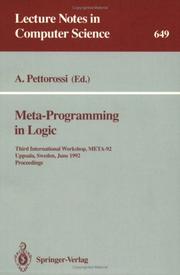
ISBN: 3540562826 0387562826 3540475052 Year: 1992 Volume: vol 649 Publisher: Berlin : Springer-Verlag,
Abstract | Keywords | Export | Availability | Bookmark
 Loading...
Loading...Choose an application
- Reference Manager
- EndNote
- RefWorks (Direct export to RefWorks)
This volume contains lectures and papers delivered at Meta 92, the Third International Workshop on Metaprogramming in Logic, held in Uppsala, Sweden,June 1992. The topics covered include foundations of metaprogramming in logic, proposals for metaprogramming languages, techniques for knowledgerepresentation and belief systems, and program transformation and analysis in logic. Particular topics include belief revision systems, intensionaldeduction, belief systems and metaprogramming, principles of partial deduction, termination in logic programs, semantics of the "vanilla" metainterpreter, a complete resolution method for metaprogramming, semanticsof "demo", hierarchical metalogics, the naming relation in metalevel systems, modules, reflective agents, compiler optimizations, metalogic and object-oriented facilities, parallel logic languages, the use of metaprogramming for legal reasoning, representing objects and inheritance, transformation of normal programs, negation in automatically generated logic programs, reordering of literals in deductive databases, abstract interpretations, and interarguments in constraint logic programs.
Logic programming --- -681.3*F41 --- 681.3*I2 --- 681.3*I22 --- 681.3*I23 --- Computer programming --- Congresses --- Mathematical logic: computability theory; computational logic; lambda calculus; logic programming; mechanical theorem proving; model theory; proof theory;recursive function theory--See also {681.3*F11}; {681.3*I22}; {681.3*I23} --- Artificial intelligence. AI --- Automatic programming: automatic analysis of algorithms; program modification; program synthesis; program transformation; program verification (Artificialintelligence)--See also {681.3*D12}; {681.3*F31} --- Deduction and theorem proving: answer/reason extraction; reasoning; resolution; metatheory; mathematical induction; logic programming (Artificial intelligence) --- 681.3*I23 Deduction and theorem proving: answer/reason extraction; reasoning; resolution; metatheory; mathematical induction; logic programming (Artificial intelligence) --- 681.3*I22 Automatic programming: automatic analysis of algorithms; program modification; program synthesis; program transformation; program verification (Artificialintelligence)--See also {681.3*D12}; {681.3*F31} --- 681.3*I2 Artificial intelligence. AI --- 681.3*F41 Mathematical logic: computability theory; computational logic; lambda calculus; logic programming; mechanical theorem proving; model theory; proof theory;recursive function theory--See also {681.3*F11}; {681.3*I22}; {681.3*I23} --- 681.3*F41 --- Information theory. --- Software engineering. --- Logic, Symbolic and mathematical. --- Computer science. --- Artificial intelligence. --- Theory of Computation. --- Software Engineering/Programming and Operating Systems. --- Mathematical Logic and Foundations. --- Mathematical Logic and Formal Languages. --- Artificial Intelligence. --- AI (Artificial intelligence) --- Artificial thinking --- Electronic brains --- Intellectronics --- Intelligence, Artificial --- Intelligent machines --- Machine intelligence --- Thinking, Artificial --- Bionics --- Cognitive science --- Digital computer simulation --- Electronic data processing --- Logic machines --- Machine theory --- Self-organizing systems --- Simulation methods --- Fifth generation computers --- Neural computers --- Informatics --- Science --- Algebra of logic --- Logic, Universal --- Mathematical logic --- Symbolic and mathematical logic --- Symbolic logic --- Mathematics --- Algebra, Abstract --- Metamathematics --- Set theory --- Syllogism --- Computer software engineering --- Engineering --- Communication theory --- Communication --- Cybernetics
Book
ISBN: 3540562834 3540475060 9783540562832 Year: 1992 Volume: 651 Publisher: Berlin Springer
Abstract | Keywords | Export | Availability | Bookmark
 Loading...
Loading...Choose an application
- Reference Manager
- EndNote
- RefWorks (Direct export to RefWorks)
This monograph is concerned with the application of temporal logic to the areas of message passing and time-critical systems. Apart from the practicaluse of temporal logic for these two application domains, the book also incorporates pure fundamental studies on temporal logic. The motivation to study message passing and time critical systems stems from their importance in practice. Message passing is one of the most important means of interprocess communication in distributed systems, either on a high level, as in telecommunications applications, or on a lower level, as in implementations of languages like Ada. As for time-critical systems, among the growing number of real-time applications there are some highly critical systems such as computer controlled chemical plants and nuclear power stations. The monograph shows how standard temporal logic can be used for the specification of message passing systems, and develops a special temporal logic for reasoning about quantitative temporal properties.The main application area is that of distributed real-time systems.
681.3*F31 --- 681.3*F41 --- 681.3*J7 --- Specifying anf verifying and reasoning about programs: assertions; invariants; mechanical verification; pre- and post-conditions (Logics and meanings of programs)--See also {681.3*D21}; {681.3*D24}; {681.3*D31}; {681.3*E1} --- Mathematical logic: computability theory; computational logic; lambda calculus; logic programming; mechanical theorem proving; model theory; proof theory;recursive function theory--See also {681.3*F11}; {681.3*I22}; {681.3*I23} --- Computers in other systems: command and control; consumer products; industrial control; process control; publishing; real time--See also {681.3*C3} --- 681.3*J7 Computers in other systems: command and control; consumer products; industrial control; process control; publishing; real time--See also {681.3*C3} --- 681.3*F41 Mathematical logic: computability theory; computational logic; lambda calculus; logic programming; mechanical theorem proving; model theory; proof theory;recursive function theory--See also {681.3*F11}; {681.3*I22}; {681.3*I23} --- 681.3*F31 Specifying anf verifying and reasoning about programs: assertions; invariants; mechanical verification; pre- and post-conditions (Logics and meanings of programs)--See also {681.3*D21}; {681.3*D24}; {681.3*D31}; {681.3*E1} --- Data transmission systems --- Logic, symbolic and mathematical --- Information theory. --- Computer network architectures. --- Mathematics. --- Logic design. --- Computer science. --- Theory of Computation. --- Computer System Implementation. --- Applications of Mathematics. --- Logics and Meanings of Programs. --- Mathematical Logic and Formal Languages. --- Informatics --- Science --- Design, Logic --- Design of logic systems --- Digital electronics --- Electronic circuit design --- Logic circuits --- Machine theory --- Switching theory --- Math --- Architectures, Computer network --- Network architectures, Computer --- Computer architecture --- Communication theory --- Communication --- Cybernetics
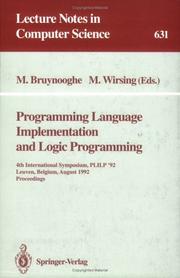
ISBN: 3540558446 0387558446 3540472975 Year: 1992 Volume: vol 631 Publisher: Berlin : Springer-Verlag,
Abstract | Keywords | Export | Availability | Bookmark
 Loading...
Loading...Choose an application
- Reference Manager
- EndNote
- RefWorks (Direct export to RefWorks)
This volume contains the papers accepted for presentation at the Fourth International Symposium on Programming Language Implementation and Logic Programming (PLILP '92) held in Leuven, Belgium, August 26-28, 1992. Theaim of the symposium was to explore new declarative concepts, methods and techniques relevant for implementation of all kinds of programming languages, whether algorithmic or declarative. The symposium gathered researchers from the fields of algorithmic programming languages as well as logic, functional, and object-oriented programming. The topics discussed in the volume include: - Declarative implementation techniques; - Implementation of declarative concepts and modules; - Compiler specification and construction; - Program transformation; - Programming environments for declarative languages; - Amalgamation of logic programming with algorithmic, functional, or object-oriented techniques; - Executable specification.
681.3*D31 --- 681.3*F33 --- 681.3*F41 --- 681.3*F42 --- 681.3*I23 --- Formal definitions and theory: semantics; syntax (Programming languages)--See also {681.3*D21}; {681.3*F31}; {681.3*F32}; {681.3*F42}; {681.3*F43} --- Studies of program constructs: control primitives; functional constructs; program and recursion schemes; type structure (Logics and meanings of programs)-- See also {681.3*D32}; {681.3*D33} --- Mathematical logic: computability theory; computational logic; lambda calculus; logic programming; mechanical theorem proving; model theory; proof theory;recursive function theory--See also {681.3*F11}; {681.3*I22}; {681.3*I23} --- Grammars and other rewriting systems: decision problems; grammar types; parallel rewriting systems; parsing; thue systems (Mathematical logic and formal languages)--See also {681.3*D31} --- Deduction and theorem proving: answer/reason extraction; reasoning; resolution; metatheory; mathematical induction; logic programming (Artificial intelligence) --- 681.3*I23 Deduction and theorem proving: answer/reason extraction; reasoning; resolution; metatheory; mathematical induction; logic programming (Artificial intelligence) --- 681.3*F42 Grammars and other rewriting systems: decision problems; grammar types; parallel rewriting systems; parsing; thue systems (Mathematical logic and formal languages)--See also {681.3*D31} --- 681.3*F41 Mathematical logic: computability theory; computational logic; lambda calculus; logic programming; mechanical theorem proving; model theory; proof theory;recursive function theory--See also {681.3*F11}; {681.3*I22}; {681.3*I23} --- 681.3*F33 Studies of program constructs: control primitives; functional constructs; program and recursion schemes; type structure (Logics and meanings of programs)-- See also {681.3*D32}; {681.3*D33} --- 681.3*D31 Formal definitions and theory: semantics; syntax (Programming languages)--See also {681.3*D21}; {681.3*F31}; {681.3*F32}; {681.3*F42}; {681.3*F43} --- Programming languages (Electronic computers) --- Congresses --- Logic programming --- Computer science. --- Information theory. --- Logic design. --- Artificial intelligence. --- Programming Techniques. --- Theory of Computation. --- Programming Languages, Compilers, Interpreters. --- Logics and Meanings of Programs. --- Mathematical Logic and Formal Languages. --- Artificial Intelligence. --- AI (Artificial intelligence) --- Artificial thinking --- Electronic brains --- Intellectronics --- Intelligence, Artificial --- Intelligent machines --- Machine intelligence --- Thinking, Artificial --- Bionics --- Cognitive science --- Digital computer simulation --- Electronic data processing --- Logic machines --- Machine theory --- Self-organizing systems --- Simulation methods --- Fifth generation computers --- Neural computers --- Design, Logic --- Design of logic systems --- Digital electronics --- Electronic circuit design --- Logic circuits --- Switching theory --- Communication theory --- Communication --- Cybernetics --- Informatics --- Science
| Listing 1 - 10 of 10 |
Sort by
|

 Search
Search Feedback
Feedback About
About Help
Help News
News